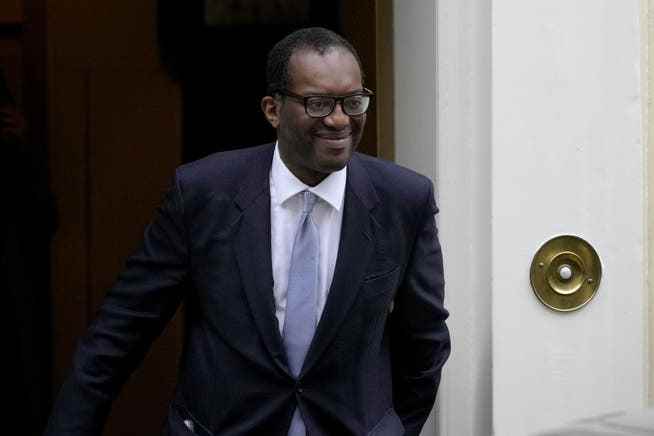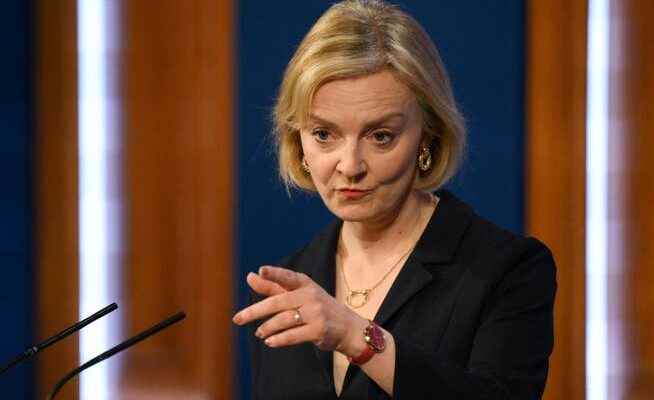The British Prime Minister is giving in to her critics and the pressure from the financial markets and is partially withdrawing the announced tax cuts. Your political future is by no means secured.
The Prime Minister has become a burden for her party in record time.
From day one of her young tenure, British Prime Minister Liz Truss found herself in an impasse from which only retreat could get her out. She surprised the country, the party, her parliamentary group and even parts of her cabinet with a radical reform program that nobody asked for. She ignored all good advice and warnings. In her grandiose overconfidence, she let nothing and no one deter her and ran straight to ruin.
Now she’s finally pulled the emergency brake to save herself at the last minute. With remarkable coolness, she dismissed her Chancellor of the Exchequer, Kwasi Kwarteng, who, with just 38 days in office, will go down in Great Britain’s great history as one of the shortest-lived finance ministers. Most of the tax cuts that Kwarteng and Truss have represented as a core element of their political program will be withdrawn. As the new strongman in the Treasury, Truss must accept omnivalent former Minister Jeremy Hunt. As a supple representative of the party establishment, he is apparently supposed to ensure that the government no longer undertakes any more foolhardy experiments.
The political program is collapsing
Truss not only loses her closest comrade-in-arms, but also the basis of her promise, made when she ran for party leader, to bring Britain back to strong growth through radical reforms. Truss had surprised the party and financial markets by announcing £45 billion in tax cuts to be funded by new debt. Since at the same time she announced even higher new debts for a relief package because of the high energy costs, the interest rates for government bonds exploded on the capital market. The British pound collapsed, as did the Conservative Party’s polls.
At the party conference last week, Truss was already forced by her parliamentary group to withdraw the politically significant reduction in the top tax rate for particularly high incomes. In a second step, it is now refraining from reversing the previous government’s decision to increase the corporate tax rate from 19 to 25 percent. This will roughly halve the tax cuts planned by Truss. What remains of the announced radical change in policy is the vague promise of deregulation and a reduction in bureaucracy that every conservative government makes when it takes office, but which is always difficult to implement.
It is therefore very doubtful that the prime minister will succeed in driving economic growth vigorously. The confidence in the financial markets, which is so important for the development of interest rates, will not return so easily either; the first reactions seem rather skeptical.

The confident Kwasi Kwarteng will go down in history as one of the shortest-lived Chancellors of the Exchequer.
Inexplicable failure of an experienced politician
Truss admitted in London on Friday that the situation was difficult. Your government program went further than expected by the financial markets. Therefore, she now has to adjust the way she implements her mission. So was the turbulence of the last few weeks just a misunderstanding? Can the Truss government now go back to business as usual?
No one in Westminster politics believes Truss’s subterfuge. She had campaigned for the party leadership by promising tax cuts, setting herself apart from her rival, the respected Chancellor of the Exchequer Rishi Sunak. Putting the responsibility on the dismissed Kwarteng doesn’t work.
Worse still is the stubbornness and hubris with which Truss tried to push through her program, even though she had neither the understanding of the financial markets nor the approval of the voters or her own faction. It is inexplicable how an experienced politician, who after all has served as a minister in various Conservative governments for the last ten years, can miscalculate in such a way.
Truss is a mortgage for the party
That is why it has long been regarded as a heavy burden for the Conservative Party, which will have to face the voters in a good two years at the latest. Whether Truss can actually save her skin by dropping Kwartengs is highly uncertain.
But the party strategists are only faced with bad options. If, after less than two months in office, they get rid of the fourth party leader in six years, the party will look ridiculous and lose credibility. It would be difficult for a successor to regain trust and lead the party convincingly into the next election campaign.
However, if the party sticks to Truss, the memory of their disastrous inauguration will carry over into the next campaign, making it easy for Labor to campaign for a change of government. If, on the other hand, the Tories are already calling elections as a third alternative, the huge increase in Labor’s lead in the voter polls caused by the turbulence surrounding Truss and her predecessor Johnson threatens to prepare the Tories for a crushing defeat. The Conservative MPs will hardly want to take the high risk of losing their own seat in the near future.
Rather, the election of Jeremy Hunt as Chancellor of the Exchequer indicates that the party could postpone the logical step for the time being. The deputies seem to be hoping to be able to control their boss better in the future. However, it is highly doubtful whether this will work and how long such a discredited party leader and prime minister can be retained. With Truss, Tory voter polls are unlikely to improve much. The party’s next act of desperation should only be a matter of time.
